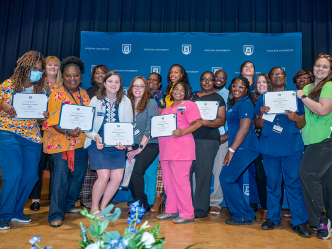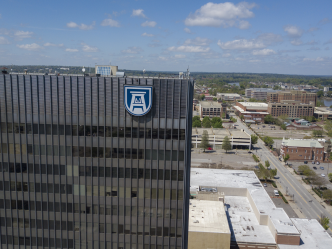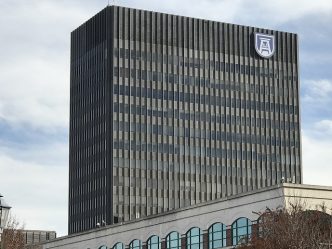Augusta University is committed to providing its employees with the most up to date information regarding the changes to the Fair Labor Standards Act (FLSA)
As details continue to be finalized, we will post a running list of updates in reverse chronological order here.
These updates will also be added where appropriate in the sections below: however, if you’re already familiar with that material, this will be where to go for a concise list of the updates only.
Jagwire publish date Oct. 20:
Added to the For Supervisors section:
When are the changes going into effect?
- For university employees changing from exempt to non-exempt, the change takes effect Sunday, Oct. 23, which is the first day of the two-week pay period Oct. 23-Nov. 5.
- For AUMC employees changing from exempt to non-exempt, the change takes effect Oct. 30. For AUMA employees, the change takes effect Oct. 31.
Isn’t the university date different from what we were originally given?
Yes, based on employee feedback we received through the Employee Advisory Council, we changed the implementation date.
What do my newly non-exempt employee(s) need to do as of the effective date?
Newly non-exempt employees need to begin logging their daily time into and out of TimeNet beginning on the effective date (Oct. 23 for university employees, Oct. 30 for AUMC employees and Oct. 31 for AUMA employees).
When will they receive their first two-week paycheck?
- University: Nov. 10, and it will be for two full weeks pay for the pay period ending Nov. 5. After that, they will receive a paycheck every two weeks.
- Health System: Nov. 18, and it will be for a full two-week period. Their second paycheck will come Dec. 2, with two more paychecks in December, on the 16th and 30th.
Why the delay from the end of the pay period to the paycheck date?
FLSA rules require a time lag so that all employee work hours can be accurately counted.
What is not changing?
- Your employee’s annual budgeted compensation will not change
- Your employee’s job and job title will not change
- Your employee’s immediate supervisor will not change
- Your employee’s benefits will not change
More specifically, what do I need to do?
- DO set expectations around hours to be worked weekly.
- DO evaluate work responsibilities to determine how the work can be done within 40 hours each week.
- DO set expectations around employees responding to emails, texts or phone calls after hours.
- DO be clear with employees that they must request and receive your approval before working any overtime.
- DO be clear with employees that all time worked must be captured within TimeNet. TimeNet is the system of record for recording all time worked.
- DO be clear that working “off the clock” is not permitted. This could become an FLSA violation and subject the university to fines and other penalties.
- DO consider flexible scheduling within each work week to minimize the need for overtime.
- DO monitor TimeNet during the week to identify any employees who may be trending to exceed 40 hours in the week.
- For University employees, DO emphasize that compensatory time is allowed under the allow rather than direct overtime pay and that AU a longstanding institutional practice of providing comp time before direct overtime pay.
- For University employees, DO monitor Compensatory time and ensure that it is being used throughout the year and before June 30th.
- DO recognize your budget management responsibilities and that any decision to make direct payment for overtime must be supported by your departmental/unit/grant budget. Departmental budgets will not be supplemented to cover overtime.
What should I NOT do?
- DON’T allow employees to work “off the clock” or “volunteer” and address immediately if you determine that they have done this. (Recognize that you may have to follow up with corrective action if the employee continues to “work off the clock.”)
- DON’T say or do anything to imply that employees must work “off the clock.” This is a direct violation of the FLSA and will subject the University to fines and penalties.
- DON’T email, call or text after hours without being clear about response expectations. Set expectations up front and understand that our ability to work through technology will need to be counted as time worked, unless “de minimis.”
- DON’T underestimate that employee’s are researching the FLSA and may have questions; please be sure to engage HR before answering.
What about TimeNet?
- University employees will be paid as a monthly employee from Oct. 1-22. University supervisors must complete the October monthly timecard for affected university employees no later than COB on October 19th.
- AUMC employees will be paid as a monthly employee from Oct. 1-29. AUMC supervisors must complete the October monthly timecard for affected university employees no later than COB on October 25th.
- Payroll will update the panels in TimeNet that are needed to move these employees from exempt to non-exempt. The system will accept punches even if the employee is still showing as a monthly paid employee.
- Please give TimeNet administrators until COB on 10/25 (University), 11/2 (AUMC) before making any inquiries to Payroll regarding an employee’s classification in TimeNet. They need a little time to get everyone transitioned over.
How are managers to monitor and manage time of non-exempt employees who must travel for their work? What guidance should a manager provide to his/her employee?
A manager is expected to manage the time worked of his/her employees even when the employee is traveling. Since all work-related travel must be approved in advance, the manager should review the proposed travel, the itinerary and any conference or meeting schedule to identify what time will be compensable and what time may not be compensable. The manager and the employee are expected to agree in advance how the time traveling will be treated. Following the travel, the manager should confirm the hours worked with the employee and ensure that the start and end time for each day is properly entered into the TimeNet system. The following guidelines from the Department of Labor Fact Sheet on “Hours Worked under the Fair Labor Standards Act (FLSA)” will apply:
“Travel Time: The principles which apply in determining whether time spent in travel is compensable time depends upon the kind of travel involved.
Home to Work Travel: An employee who travels from home before the regular workday and returns to his/her home at the end of the work day is engaged in ordinary home to work travel, which is not work time.
Home to Work on a Special One Day Assignment in Another City: An employee who regularly works at a fixed location in one city is given a special one day assignment in another city and returns home the same day. The time spent in traveling to and returning from the other city is work time, except that the employer may deduct/not count that time the employee would normally spend commuting to the regular work site.
Travel That is All in a Day’s Work: Time spent by an employee in travel as part of their principal activity such as travel from job site to job site during the work day, is work time and must be counted as hours worked.
Travel Away from Home Community: Travel that keeps an employee away from home overnight is travel away from home. Travel away from home is clearly work time when it cuts across the employee’s workday. The time is not only hours worked on regular working days during normal working hours but also during corresponding hours on nonworking days. As an enforcement policy the Division will not consider as work time that time spent in travel away from home outside of regular working hours as a passenger on an airplane, train, boat, bus or automobile.”
For Augusta University, the following examples are based on the guidance above.
- An employee lives in Aiken, South Carolina, and drives to the Health Sciences campus every day for work. The drive to work usually takes about 25 minutes and the drive home takes about the same, depending on traffic. This time is not work time but rather normal commute time.
- The employee who lives in Aiken, South Carolina, needs to attend a meeting in Atlanta. The employee leaves her home at 7:00 a.m. The employee would be considered to be working as of 7:25 a.m. that day.
- An employee whose regular office location is on the Summerville campus but who regularly attends meetings on the Health Sciences campus will be considered to be engaged in continuous work when traveling to and from the Health Sciences location under the “Travel That is All in a Day’s Work” section listed above.
- An employee who lives in Grovetown, Georgia, who travels to Atlanta for a two-day conference, including overnight travel, will be covered by the “Travel Away from Home Community” section listed above. Travel will be considered work time when it cuts across the employee’s workday. Therefore, if the employee leaves his/her home at 7:00 a.m., arrives in Atlanta to begin the conference at 10:00 a.m. and participates in sessions that last until 5:00 p.m., excluding a one-hour break for lunch that was not a working lunch, the employee should be recorded as working nine hours. If the employee’s conference begins at 8 a.m. and ends at 12:30 p.m. on the following day, the employee takes a 30-minute lunch and then returns to Augusta to his/her regular work location on campus and works until 5 p.m. that day, the employee would then be credited for 8.5 hours of work time. If however, the supervisor has indicated that the employee need not return to the office when the employee arrives home, and the employee arrives home at 3:30 p.m., the employee will be credited with working seven hours for the second day.
What if I have an employee who wants to attend a lecture or training program that is not required for his/her job?
The DOL Fact Sheet includes the following: “Lectures, Meeting and Training Programs: Attendance at lectures, meetings, training programs and similar activities need not be counted as working time only if four criteria are met, namely: It is outside normal hours, it is voluntary, not job related, and no other work is concurrently performed.” Therefore, if you have an employee who is attending an evening lecture after regular work hours, there no requirement to attend the lecture, it is unrelated to his/her job and the employee is not engaged in work while attending the lecture, the time spent is not work time and thus no compensation is required. However, if you as a manager require your employees to attend a lecture after hours as a way of enhancing the employees’ job knowledge, the time spent at the lecture would be considered time worked and therefore compensable. In a week when this occurs, you can adjust the employees’ work schedule to allow them to leave early on another day to ensure that the hours worked for that week do not exceed 40 hours.
What if I have a non-exempt employee who, separate from his/her regular job with the university, serves as a voluntary advisor to a student group and will be traveling with the student group to an out of town location for a weekend trip? What amount of time is considered compensable?
If the advisor role is considered voluntary, then the out of town travel is also voluntary. If however, the university has chosen to treat the advisor role and any associated travel-related activities as not voluntary, then the employee’s activity should be addressed under the extra duty policy and an appropriate hourly rate established for the extra duty work. The hours working during the weekend trip must be recorded and reported to ensure an accurate calculation for payroll purposes. Prior to the trip, the responsible university administrator who oversees the student group should review with the advisor the itinerary for the trip and determine what time will be considered working hours and what time will not be working hours. For example, the administrator and the advisor may agree to exclude meal breaks and sleeping periods of not more than eight hours (the sleep time may be excluded provided at least five hours of sleep time is taken without interruption). Also, for advisor activities that occur on campus, the advisor should also complete the extra duty time recording sheet at the conclusion of each activity or at the end of each month and submit to an appropriate university administrator for approval who will then submit to payroll.
How will the annual and holiday/leave cash-out option work for newly non-exempt employees?
USG is offering employees the opportunity to “cash out” up to 48 hours of their annual leave and unscheduled holiday leave to help with the transition.
- This is a one-time only option limited to affected employees, which may be exercised through May 5, 2017.
- This is a voluntary option.
- An employee may not use or convert sick leave for this purpose.
- Employees with fewer than 48 hours will be allowed to use their full available annual leave balance.
- Only hours that have already been accrued may be requested. (Employees may not request leave they expect to earn in the future.)
- Employees will not be able to buy back hours at a later date.
- Employees electing this option will receive the vacation and/or unscheduled holiday along with their regular pay for hours worked.
How do employees apply for the cash-out option?
- Employees will fill out the Vacation Cash-Out Request Form [link] and provide it to you.
- You will confirm that the employee has the leave hours available and that any leave already requested and approved will be adjusted, if necessary.
- For example, an employee with 58 hours of annual leave who has been approved for a week of leave (40 hours) in December and who now decides to request 48 hours of vacation cash out for their October check may have to void or reduce the leave requested for December, since they will no longer have the hours available. You may still approve the leave, but remind the employee:
- that any leave in excess of their balance will be leave without pay, and
- that leave may not be taken before it is accrued.
- You will sign the form and return it to the employee to submit to Tamara Rehbein in the Payroll Office.
- For example, an employee with 58 hours of annual leave who has been approved for a week of leave (40 hours) in December and who now decides to request 48 hours of vacation cash out for their October check may have to void or reduce the leave requested for December, since they will no longer have the hours available. You may still approve the leave, but remind the employee:
Deadlines to receive the cash-out pay for each pay period can be found [here]. Forms received after the specified deadlines will be paid out on the following payroll (with the exception of the final deadline of May 5).
Added to the What it means to employees section
If I travel for my job, how should I track my travel time?
In general, time spent traveling during your normal work hours is considered worked time, though some travel activities are compensable and some are not.
Prior to traveling, a non-exempt employee should discuss with her or her manager how to record time while traveling and how it will be compensated. If traveling to a conference or meeting, the conference schedule or meeting agenda will generally provide a reasonable guide for what time is considered compensable time. The following guidelines will generally apply:
Travel during the employee’s standard work hours will be recorded as regular time worked and the employee’s supervisor will be expected to enter the hours worked using the TimeNet System if the employee is not able to enter the time themselves. Following the travel, the supervisor is expected to confirm the hours with the employee and make any necessary adjustments in TimeNet.
Travel outside of the employee’s standard work hours will be recorded as regular time worked:
- When the employee is actually en route to and/or from the alternate location, via commercial transportation or private car; however, when an employee is traveling by air or rental vehicle, time worked will begin upon the arrival of the employee at the airport for departure or the location for rental car pickup and end when the employee reaches the alternate site end location, i.e., hotel or conference site.
- When the employee is at the alternate location and engaged in work for the benefit of Augusta University, including attending meetings or conference sessions. Meal periods are not paid while traveling unless it is a working meal period, i.e., a working lunch. Free time once at the alternate location and/or time for meals, receptions or other non-work activities will not be considered time worked, even if provided by the conference.
Jagwire publish date Sept. 26:
Based on employee concerns regarding the Nov. 1 FLSA implementation date, and observations that other University System of Georgia institutions have published plans with different implementation dates, we consulted our Employee Advisory Council for guidance on how to move forward. The EAC identified Oct. 23 as a date that would be less disruptive for our employees and an exception was requested to allow us to implement the changes on that date. Our colleagues at the USG have approved our request for this revised schedule, so we are moving quickly to communicate the change and implement the plan.
This communication is an update to previous communications concerning the FLSA implementation. We are pleased to announce an implementation schedule change for University employees only. The implementation schedules established for the Medical Center and Medical Associates are not affected by this change and will proceed as planned.
Revised University Implementation Schedule
As you know, we had announced an implementation schedule that included November 1 as the effective date for University employees changing from exempt to non-exempt. This date had been identified by the USG for its member institutions and we modified our prior schedule based on this new date. The date raised concerns for employees, their managers and us as leaders becau se it would result in our affected employees’ first check under the new schedule including only 4 working days. Based on our collective concerns about this, and observations that other USG institutions have published plans with different implementation dates from the USG specified date, we consulted our University Employee Advisory Council for their input. The EAC identified October 23, 2016, as a date that would be less disruptive for our university employees affected by the change and an exception to the USG date was requested. We have received approval in writing from our colleagues at the USG for this revised schedule, so we are moving quickly to communicate the change and implement the plan.
University Positions Changing from Exempt to Non-Exempt
- Effective October 23, 2016, employees who are being reclassified from exempt to non-exempt will begin to use the TimeNet System to record time worked and will be paid bi-weekly according to the non-exempt payroll schedule.
- The paycheck they receive on October 31, 2016, will be their last monthly paycheck. This paycheck will for the period of October 1 through October 22.
- They will receive their first pay check as a non-exempt employee on November 10, 2016, and it will be for the period of October 23 through November 5.
- Thereafter, they will be paid every other Friday. (If Friday is a holiday, they will be paid the last working day of the week.)
University Positions Continuing as Exempt
- For employees receiving an increase to their pay to maintain the exempt designation, the effective date of the increase remains December 1, 2016. The Budget Services Office will provide information closer to this date regarding any budgetary changes that are needed.
For both types of changes, Human Resources will make the necessary entries in the PeopleSoft System and no ePARs will be necessary.
Employee Notices
Because of this change, we need to reissue employee notices and will do so by Tuesday, September 20. Your continued assistance and support are needed to distribute official notices to affected employees via departmental management. We will follow the same general distribution method as before and Human Resources will send to the primary leader, which could be a vice president, dean, or director, the list of the leader’s employees who are affected and a personal letter for each employee in their area. Like before, please coordinate with the employee’s immediate supervisor to have the supervisor deliver the letter to the affected employee not later than Thursday, September 22, and let them know the news of the date change which is the result of employee feedback.
TimeNet Training for Employees and their Supervisors
Payroll will be conducting TimeNet training sessions on:
Monday 10/3 from 11-1 in Greenblatt Library Room AB 127
Thursday 10/6 from 11:15-2:00 in Allgood Hall N132
Town Hall Meetings
Employees
Wed., 9/28 at 12:00 noon – HS Campus, Lee Auditorium, BC1040
Wed., 9/28 at 3:30 – S Campus, Allgood Hall, AHN234
Managers
Thurs., 9/29 at 8:00 – S Campus, University Hall, UH221
Thurs., 9/29 at 4:00 – HS Campus, Small Auditorium, BC1400 (Research focus)
Tues., 10/4 at 11:15 – HS Campus, Small Auditorium, BC1400
Jagwire will continue to be our primary method of communication with FAQs updated regularly and training dates and other information posted as they become available.
 Augusta University
Augusta University




